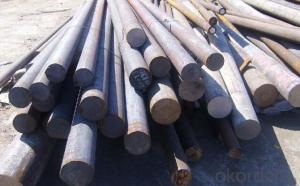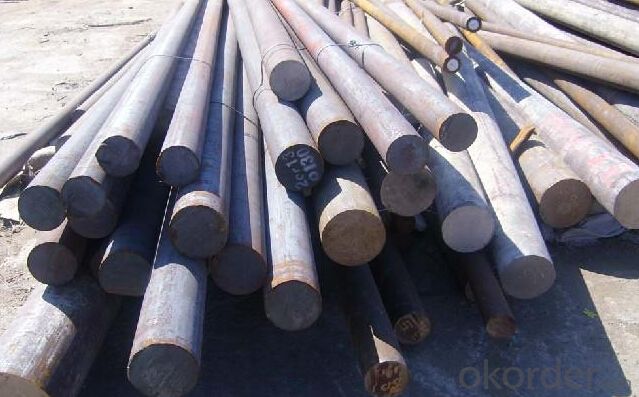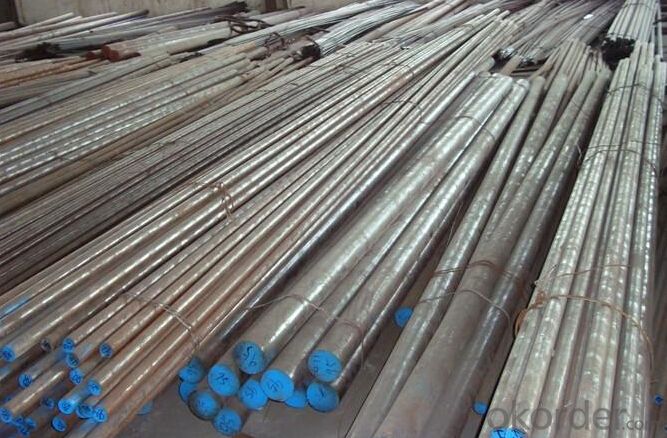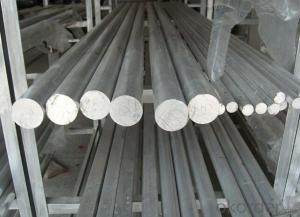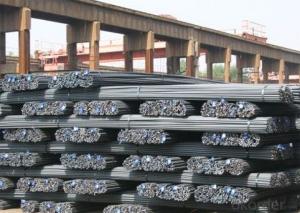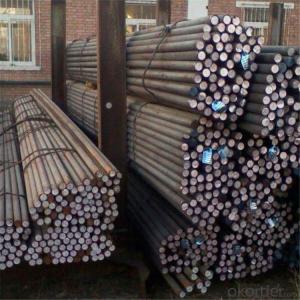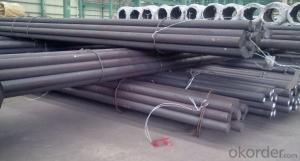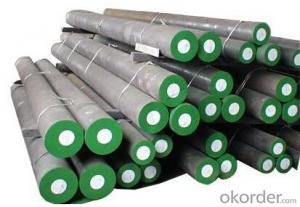Grade S48C CNBM Hot Rolled Alloy Steel Bar
- Loading Port:
- Shanghai
- Payment Terms:
- TT OR LC
- Min Order Qty:
- 3 m.t.
- Supply Capability:
- 10000 m.t./month
OKorder Service Pledge
OKorder Financial Service
You Might Also Like
Specification
Specifications of Steel Round Rod Bar:
Material | S48C | Round bar | Dia(mm) | 16-600 |
Process | EAF + LF + VD + Forged + Heat Treatment (optional) | Length (mm) | Max 12000 | |
Heat treatment | Normalized / Annealed / Quenched / tempered | Flat bar | Thickness(mm) | 8-500 |
Delivery condition | Hot forged +Rough machined (black surface after Q/T)+ Turned (optional) | Width(mm) | 70-200 | |
Test | Ultrasonic test according to SEP 1921-84 D/d | Length (mm) | Max 12000 | |
Chemical Composition:
C | Si | Mn | Cr | Mo |
0.26~0.34 | 0.17~0.37 | 0.40~0.70 | 0.80~1.10 | 0.15~0.25 |
Usage and Applications:
used for manufacturing the forging that have higher strength
and tempering section, just like the gear wheel used for
locomotive traction,booster Transmissioon gear,back
axle.connecting rod that have heavy loadign,and spring
clip,it can also used for tool joint of oil deep well under
2000meters and fishing tool.
Packaging & Delivery:
Packaging Detail: Standard seaworthy packing or as customer required; all goods are packed in bundle with steel strips and shipped by break bulk vessel or container
Delivery Detail: 45 days
Production Flow:
EAF+LF+VD+ Forged+ Heat Treatment
Material prepare (billet) — heat up — rough rolling — precision rolling — cooling — packing — storage and transportation
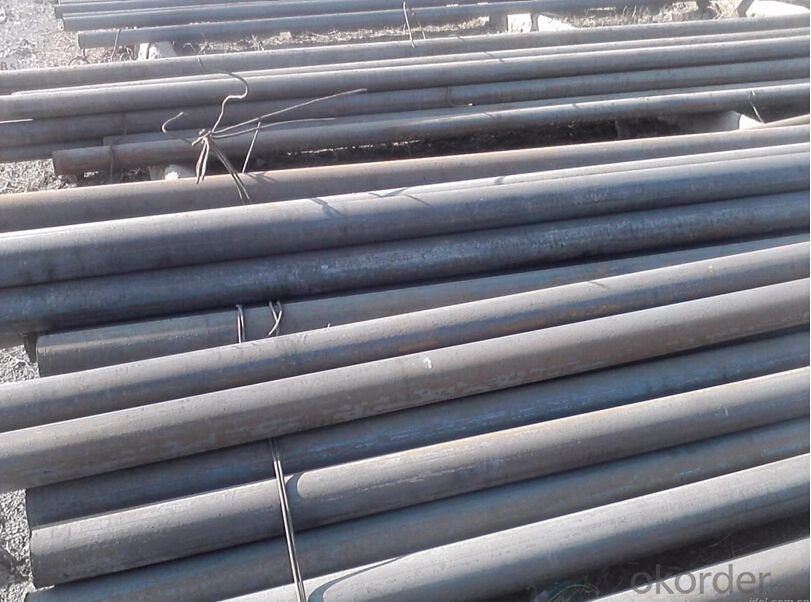
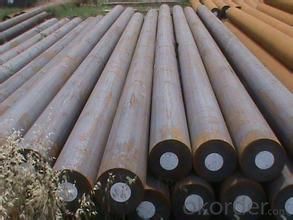
Quality Assurance:
1. We will strictly inspect our production that we sold according to the customer’s request.
2. Our steel reaches international quality standards.
3. Quality should be in conformity with the specification of the manufacturer. Quantity and packing conditions should be in conformity with the term in the contract.
4. Should the packing found damaged, the buyer has the right to claim to the seller
- Q: How does special steel contribute to improving product efficiency?
- Special steel contributes to improving product efficiency in several ways. Firstly, special steel is known for its high strength and durability, allowing manufacturers to design products that can withstand heavy loads and harsh conditions without compromising on performance. This enables the creation of more efficient and reliable products, as they can operate at optimal levels for longer periods. Additionally, special steel offers excellent corrosion resistance, which is crucial for products exposed to moisture, chemicals, or extreme temperatures. By using special steel in the manufacturing process, products can be protected from rust and other forms of degradation, ensuring their longevity and reducing the need for frequent maintenance or replacement. Furthermore, special steel often possesses unique properties such as heat resistance, electrical conductivity, or magnetic characteristics, which can be leveraged to enhance the efficiency of specific products. For example, in the automotive industry, special steel is used to make lightweight yet robust components, improving fuel efficiency and reducing emissions. Overall, special steel's exceptional strength, durability, corrosion resistance, and specialized properties enable manufacturers to create more efficient and reliable products, enhancing their performance, longevity, and sustainability.
- Q: How does special steel contribute to the telecommunications industry?
- Special steel plays a crucial role in the telecommunications industry by providing the necessary materials for the production of various components such as cables, connectors, and transmission towers. It offers exceptional strength, durability, and resistance to corrosion, allowing for reliable and long-lasting infrastructure. Whether it's in the form of high-tensile steel wires for cables or corrosion-resistant steel for towers, special steel ensures efficient and uninterrupted communication networks, supporting the growth and advancement of the telecommunications industry.
- Q: How is tool and die steel used in the manufacturing of molds and dies?
- Tool and die steel is essential in the manufacturing of molds and dies as it provides the required strength, hardness, and durability to withstand the high pressures and temperatures involved in the molding process. It is used to create the core and cavity sections of molds as well as the various components of dies. The steel is carefully selected based on its specific properties to ensure optimal performance and longevity in the production of molds and dies.
- Q: How does special steel perform in additive manufacturing applications?
- Special steel performs well in additive manufacturing applications due to its high strength, durability, and resistance to wear and corrosion. The unique properties of special steel, such as its ability to withstand high temperatures and extreme environments, make it an ideal material for 3D printing processes. Additionally, the flexibility and customization offered by additive manufacturing allows for the creation of complex geometries and intricate designs, further enhancing the performance of special steel in various applications.
- Q: What are the different methods of surface passivation for special steel?
- There are several methods of surface passivation for special steel, including chemical passivation, electrochemical passivation, and mechanical passivation. Chemical passivation involves treating the surface with chemicals to remove impurities and create a protective layer. Electrochemical passivation uses an electric current to form a passive oxide layer on the surface. Mechanical passivation involves physical processes such as polishing or shot peening to remove contaminants and improve surface quality. These methods help enhance the corrosion resistance and durability of special steel surfaces.
- Q: How does special steel resist thermal fatigue?
- Special steel is able to resist thermal fatigue due to its unique composition and properties. Thermal fatigue occurs when a material is subjected to repeated heating and cooling cycles, leading to the formation of cracks and eventual failure of the material. Special steel is specifically designed to withstand extreme temperature changes. It has a high melting point and excellent thermal conductivity, which allows it to efficiently dissipate heat and minimize thermal stress. Additionally, the steel is often alloyed with elements such as chromium, nickel, and molybdenum, which enhance its resistance to thermal fatigue. The alloying elements in special steel form a protective layer that acts as a barrier against oxidation and corrosion. This protective layer prevents the formation of cracks and improves the steel's ability to withstand thermal cycling. Furthermore, the alloying elements improve the steel's structural integrity by promoting the formation of fine and evenly dispersed microstructures. This enhances the steel's toughness and resistance to cracking. Moreover, special steel undergoes various heat treatment processes to further enhance its resistance to thermal fatigue. These processes involve controlled heating and cooling cycles, which refine the microstructure of the steel and make it more resistant to deformation and cracking. The heat treatment also helps in relieving any residual stresses that may have been induced during the manufacturing process. In summary, special steel resists thermal fatigue through its unique composition, alloying elements, and heat treatment processes. Its high melting point, excellent thermal conductivity, and protective layer against oxidation and corrosion make it highly resistant to thermal cycling. The refined microstructure and relieved residual stresses further enhance its ability to withstand repeated heating and cooling cycles without failure.
- Q: How does special steel contribute to the automotive racing machinery industry?
- Special steel plays a crucial role in the automotive racing machinery industry by providing high-performance materials that enhance the performance, durability, and safety of racing vehicles. One of the primary contributions of special steel to the industry is its ability to improve the power and speed of racing cars. Special steel alloys, such as carbon fiber-reinforced steel or high-strength steel, offer superior strength-to-weight ratios, allowing manufacturers to reduce the weight of the vehicle while maintaining structural integrity. This reduction in weight enhances the acceleration and maneuverability of the racing car, resulting in increased speed and improved lap times on the track. In addition to improved performance, special steel also contributes to the safety of racing vehicles. The high strength and impact resistance properties of certain steel alloys make them ideal for constructing roll cages, chassis, and other critical safety components. These materials can withstand extreme forces during crashes or collisions, providing enhanced protection for the driver and minimizing the risk of severe injuries. Special steel also contributes to the longevity and durability of automotive racing machinery. The harsh conditions of racing, such as high temperatures, vibrations, and mechanical stress, can cause regular steel to deform or deteriorate quickly. However, special steel alloys are specifically engineered to withstand these demanding environments, ensuring that racing cars can endure the rigorous demands of the sport without compromising performance or safety. Furthermore, special steel alloys offer excellent thermal conductivity and heat resistance properties, which are essential for racing vehicles that generate immense heat during high-speed runs. By efficiently dissipating heat, special steel helps prevent overheating and ensures optimal engine performance, reducing the risk of mechanical failures and maximizing the lifespan of the racing machinery. In summary, special steel contributes significantly to the automotive racing machinery industry by enhancing the performance, durability, and safety of racing vehicles. The use of high-performance steel alloys helps increase speed, improve lap times, and reduce the weight of the vehicles. It also provides superior strength and impact resistance, enhancing safety during crashes or collisions. Moreover, special steel alloys offer excellent heat resistance and thermal conductivity, ensuring optimal engine performance and prolonging the lifespan of the racing machinery.
- Q: Are there any disadvantages of using special steel?
- There are several disadvantages associated with the use of special steel. To begin with, special steel tends to be more expensive compared to regular steel. This is primarily due to the additional alloying elements and heat treatments involved in its production, which contribute to the higher cost. As a result, it may not be the most cost-effective option for applications where cost is a major factor. Furthermore, special steel may have limited availability in comparison to regular steel. It is often produced in smaller quantities and may only be obtainable from specific suppliers. This can lead to longer lead times and difficulties in sourcing the required amount of special steel, particularly for large-scale projects. Additionally, the increased complexity of working with special steel can pose challenges. It may require specialized knowledge, skills, and equipment for handling and processing. If the necessary expertise or resources are not readily available, this can result in higher manufacturing costs and potential delays in production. Moreover, some special steel grades with high strength and hardness can be more prone to brittleness. This means they may be susceptible to cracking or breaking under certain conditions, especially when exposed to extreme temperatures or sudden impact loads. This limitation can be a disadvantage in applications that require high toughness or resistance to fracture. Lastly, special steel may have limited applications due to its specific properties. While it offers advantages such as corrosion resistance, high temperature resistance, or improved mechanical properties, these benefits may not be relevant or necessary for every application. Consequently, using special steel in such cases may incur unnecessary expenses without any tangible benefits. In conclusion, special steel has its drawbacks, including higher costs, limited availability, increased complexity, potential brittleness, and limited applicability. Therefore, it is crucial to carefully consider the specific requirements of a project before opting for special steel.
- Q: What are the different surface hardening grades of special steel?
- Different surface hardening grades of special steel are available, each with specific characteristics and properties. Some commonly used grades include the following: 1. Case-hardening steels: These grades, typically low carbon steels, develop a hard outer layer while maintaining a softer core. Carburizing or nitriding processes introduce carbon or nitrogen into the steel surface. These steels are used in applications where wear resistance and toughness are necessary. 2. Tool steels: These grades are designed for cutting, forming, and shaping tools. Tool steels are known for their high hardness, wear resistance, and ability to retain a cutting edge even at high temperatures. Various types of tool steels, such as HSS, hot work steel, cold work steel, and plastic mold steel, are suitable for specific applications. 3. Stainless steels: These grades contain a minimum of 10.5% chromium, providing excellent corrosion resistance. Stainless steels can be hardened through precipitation hardening or martensitic transformation. They are commonly used in industries requiring resistance to corrosion and high temperatures, such as food processing, chemical, and medical industries. 4. High-strength steels: These grades offer exceptional strength and toughness. They often contain alloying elements like manganese, chromium, or nickel to enhance their mechanical properties. High-strength steels are commonly used in structural applications, automotive components, and heavy machinery. 5. Maraging steels: These grades are known for their high strength, toughness, and excellent resistance to fracture. Maraging steels achieve these properties through a unique aging process involving precipitation hardening. They find applications in aerospace, defense, and tooling industries. 6. Bearing steels: These grades are specially formulated to provide excellent wear resistance and durability for bearing applications. Bearing steels often contain alloying elements like chromium, molybdenum, and vanadium to enhance their mechanical properties and fatigue resistance. These examples represent the diverse range of surface hardening grades of special steel, each offering unique properties and characteristics. This allows for a wide range of applications across various industries.
- Q: How does special steel contribute to the railway industry?
- Special steel contributes to the railway industry by providing high-strength, durable and corrosion-resistant materials for various components such as rails, wheels, and axles. This ensures the safety and reliability of train operations, as special steel can withstand heavy loads, extreme temperatures, and intense wear and tear. It also enables the construction of lighter and more efficient trains, improving fuel efficiency and reducing maintenance costs. Additionally, special steel is essential for the development of advanced technologies like high-speed trains and magnetic levitation systems, pushing the boundaries of railway transportation.
Send your message to us
Grade S48C CNBM Hot Rolled Alloy Steel Bar
- Loading Port:
- Shanghai
- Payment Terms:
- TT OR LC
- Min Order Qty:
- 3 m.t.
- Supply Capability:
- 10000 m.t./month
OKorder Service Pledge
OKorder Financial Service
Similar products
Hot products
Hot Searches
Related keywords
